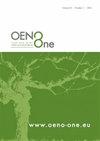Is wine an emotional object? Measurements of the subjective and automatic components of emotions in a wine-tasting situation
IF 2.2
3区 农林科学
Q3 FOOD SCIENCE & TECHNOLOGY
引用次数: 0
Abstract
Wine is often described with emotional terms, such as surprising, disappointing, or pleasant. However, very little has been done to understand the role of emotions in wine tasting and characterise this link between emotions and wine. Many studies have looked at the extrinsic factors that can improve the emotional experience of tasters when discovering a wine, but few have been carried out on the emotional impact of the organoleptic characteristics of wines. The present study aims to determine if the automatic component of emotion has a measurable output (motor and physiological) when tasting wine. If so, does wine tasting induce a concomitant activation of the different components of emotion, such as subjective feelings or physiological and motor responses?Sixty-five connoisseurs tasted seven different red Bordeaux wines with different sensory properties and quality levels pre-defined by wine experts. Emotions were measured using subjective (subjective feelings measurement using self-declarative questionnaires) and automatic (physiological measurements such as skin conductance and heart rate, or motor measurements through facial expressions) methods. The results showed that there was a measurable physiological and motor emotional output in wine tasting. The results also highlighted that changes in the autonomic nervous system in a wine-tasting situation are structured around the dimensions of pleasantness and arousal. Motor measurements taken through facial expressions showed a marginally significant difference between wines providing pleasant and unpleasant emotions for the activation intensity of action units. The relationships established between these components, as well as their concomitant activation, allow us to define wine as an emotional object.葡萄酒是情感对象吗?在品酒过程中测量情绪的主观和自动成分
人们经常用情感词汇来形容葡萄酒,比如令人惊讶、失望或愉快。然而,在了解情绪在品酒中的作用以及描述情绪和葡萄酒之间的联系方面,人们做得很少。许多研究都着眼于能够改善品酒者发现葡萄酒时的情感体验的外在因素,但很少有人对葡萄酒的感官特征对情感的影响进行研究。本研究旨在确定在品尝葡萄酒时,情感的自动成分是否有可测量的输出(运动和生理)。如果是这样的话,品酒是否会同时激活情绪的不同组成部分,比如主观感受或生理和运动反应?65位鉴赏家品尝了葡萄酒专家预先定义的七种不同的波尔多红葡萄酒,它们具有不同的感官特性和质量水平。情绪测量采用主观(主观感受测量使用自我陈述性问卷)和自动(生理测量如皮肤电导和心率,或通过面部表情运动测量)方法。结果表明,品酒过程中存在可测量的生理和运动情感输出。研究结果还强调,在品酒的情况下,自主神经系统的变化是围绕愉悦和兴奋的维度进行的。通过面部表情进行的运动测量显示,提供愉快和不愉快情绪的葡萄酒对动作单元的激活强度有轻微的显著差异。这些成分之间建立的关系,以及它们伴随的激活,使我们能够将葡萄酒定义为一种情感对象。
本文章由计算机程序翻译,如有差异,请以英文原文为准。
求助全文
约1分钟内获得全文
求助全文
来源期刊

OENO One
Agricultural and Biological Sciences-Food Science
CiteScore
4.40
自引率
13.80%
发文量
85
审稿时长
13 weeks
期刊介绍:
OENO One is a peer-reviewed journal that publishes original research, reviews, mini-reviews, short communications, perspectives and spotlights in the areas of viticulture, grapevine physiology, genomics and genetics, oenology, winemaking technology and processes, wine chemistry and quality, analytical chemistry, microbiology, sensory and consumer sciences, safety and health. OENO One belongs to the International Viticulture and Enology Society - IVES, an academic association dedicated to viticulture and enology.
 求助内容:
求助内容: 应助结果提醒方式:
应助结果提醒方式:


